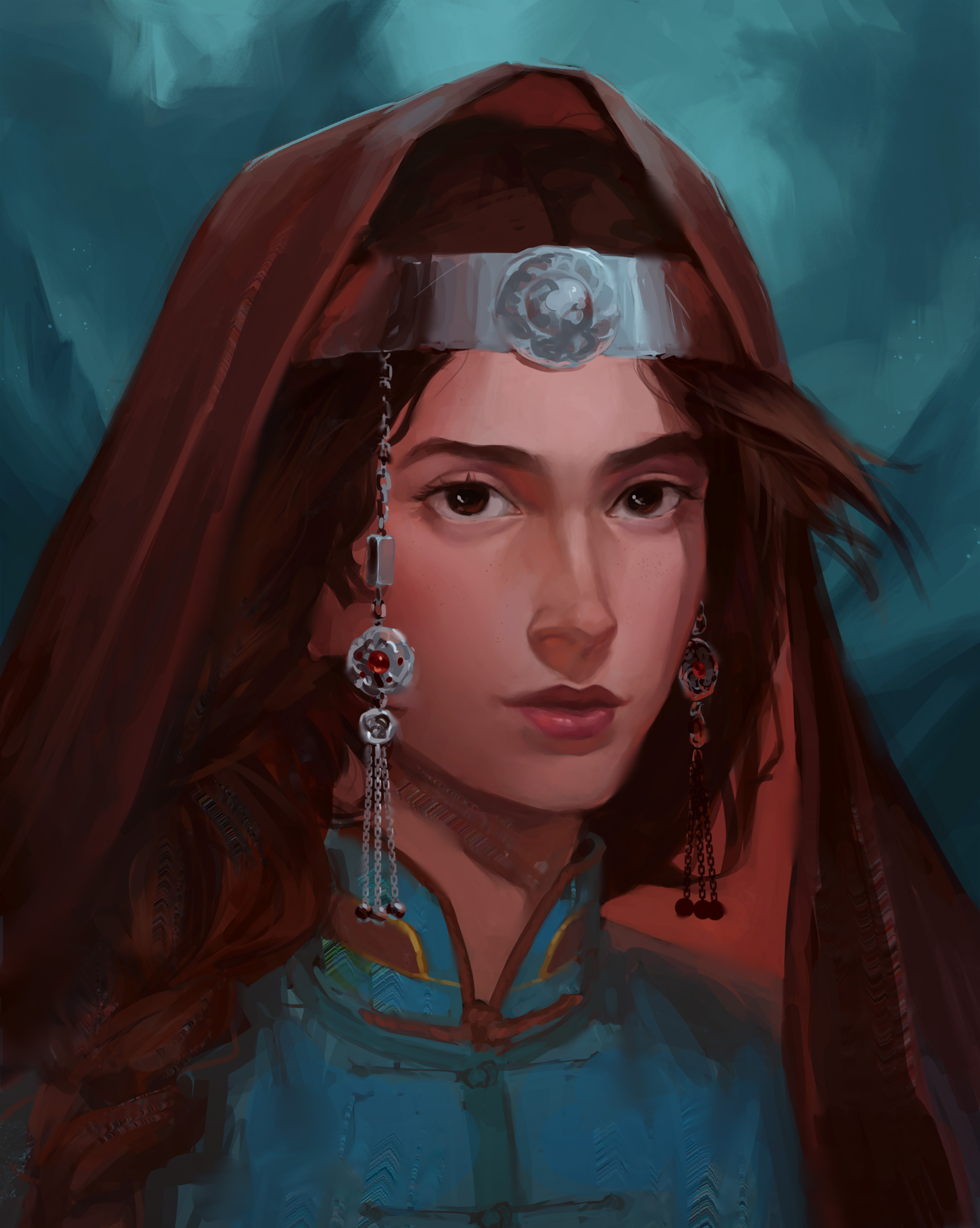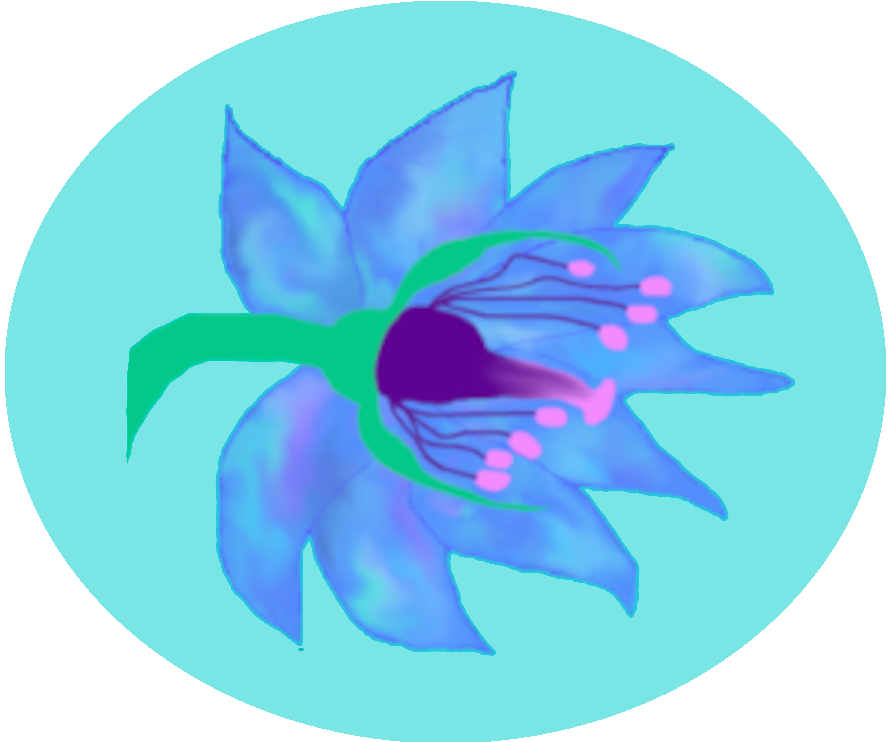Dinara
Görah (1774–1856) was an Asuran opera actress and playwright who is often called the "Treasure of Asura" and the "Singer-Mother". Her works helped preserve Asuran traditions and history, including events that have been expunged from official records. Many of her plays have been adapted to motion pictures and novels. The Dahine Theatre, managed by her company Qirelay, continues operating to this day and still provides shelter and employment.
Contents
Life
Ages end, empires fall, and even the Powers die... but never songs. Songs are eternal.— Dinara Görah (The Romance of Dragons)
Early life

The ruins of Gholhabar (1781) by Wikimedia Commons
Görah was born around 1774 in Gholhabar, a village outside of Habar, to rice farmers. She was orphaned in a raid led by House Ikra during the Radnan Turmoil. Görah's parents were devout Seranites but were killed in the crossfire along with their neighbours. Görah used her affinity–of the Water–for the first time to defend herself. In a conversation with ██████ █████████, Görah said, "Everything was wet: my face was covered with tears and my parents' blood, and I'd even wet myself. I felt I could never be clean again... I was drowning on dry land. Then, something reached for me, this terrible, incomprehensible vastness, and those soldiers drowned instead of me."
Alone, Görah wandered to Paraiz, where a schoolteacher took pity and had her raised with other orphans. This period coincided with the Revival of Arts in Asura–inspired by a similar cultural movement in the Heartlands–when opera troupes were common across the continent. Görah befriended performers, learning to dance and perform acrobatics, but she excelled most at singing. She became the city's beloved singer and entertained visiting nobility. At fifteen years old, she took the last name"Görah" and joined the Qiufen troupe.
Career
Görah first starred in minor roles but quickly played the main lead in classical plays such as
Last Alsherin and
Courtship of Dzagaria. However, it was her 1791 performance as Lady Dalion Rais in
Heart Song that pushed her into fame. Her rendition of the eponymous "Heart Song" was played on every
Western radio station. When her troupe travelled under
House Vauquelin's
banner across the
Fyrdran Kov and performed for the entourage, her voice moved even the "
Stone Lady". Naturally, Görah had many wooers, from Heartlander silk merchants to noble ladies, but never remained for long with anyone. She famously said, "It's always a hopeless case with men, of course. With women, it's not so bad, until you try to court one. Then, everything falls apart."
22-years-old Görah left the Qiufen troupe to study at the
Cordrin in Isord. "I'd dreamt of becoming one of the Cordrin's 'flowers' since I was a little girl living by a rice paddy," said Görah, who inadvertently took the long route to the school. She sang for passage aboard ships to the Heartlands, and finally Isord. In the Isordi Desert, she travelled with sand pirates ("they were as noble as any lord") to the moving city of Felnéas where she saw her first
volgrin skeleton. In her journal, Görah wrote, "For a creature I have sung countless of ballads for, it utterly stole my breath... a single rib was as tall as a tower." It took two years to find Cordrin which seemed almost plain compared to her previous encounters: "a squat building held up by columns of inauspiciously white stone".
Life at Cordrin was not as she'd imagined. Though she had funds from her opera career, Görah had to work part-time in numerous jobs to pay for accommodations, leaving her "too exhausted to even open my eyes." She was treated poorly for being Asuran–the
War of the Heirnth Coalition was still in living memory. "It's strange how much hatred people can feel towards a complete stranger," wrote Görah. However, she prospered in her six years at the Academy and later at the Domtéia Amphitheatre, before going home.
In 1801, mere days after her return to Asura, Görah established the Miramet opera company in Nevren, where she had the Cemilion Theatre constructed. Görah added her own songs and twists to existing stories per tradition but incorporated a unique blend of Asuran and Isordi music, which propelled her into greater popularity than ever before. Though people travelled across the continent for her performance, Görah rarely played the main role, letting newer actors to take lead. She wrote entirely new plays, some fictional while others recounted censored events such as the
Siege of Raykor, leading to frequent inspections and unheeded warnings.
Even as her fame grew, Görah was unhappy with the situation in Nevren and neighbouring cities. In 1803, the reorientation of the Minor Ejder in the Battle of
██████ left the Fertile Bow utterly barren, causing a famine that starved thousands. Meanwhile, poor relations with Heartlander cities had reduced food imports. Görah was close friends with the writer
Jien Kanzou and shared his views towards the Nevren council's "dangerous incompetence". Her plays, such as the humorous
Tale of the Frogmen, set in a city of anthropomorphic frogs, threw audiences into guffaws while portraying the effects of poor resource management. Other playwrights followed suit, spilling their discontent into plays. This ended in 1806 when several houses had the troupes disbanded. Persecuted performers and scriptwriters sought refuge at Cemillion Theatre. "Every morning, one of my friends would be missing as though the
Redektek had snatched them from their beds," wrote Görah and was arrested too after performing the derisive
Havoc.
Görah was beaten and thrown into the city's prison. Conditions were wretched as many prisoners died from starvation or illness before their death sentence could be carried out. Görah was sentenced to labour in the Southern Mines, but in 1808, she escaped with another labourer who was caught and shot dead. She trekked along the
Tsagadai, sheltering in a Kadriyen monastery for the winter where, "(The monks) treated me like I was family–and I didn't even share their faith. I thought if I'd seen the worst of humanity in that mine, I now saw the best of it." Though recovered, she was left with a limp and a face "battered and scarred beyond recognition." In spring, Görah rode with a caravan of
szardiye smugglers to
Erdene where she took a ship to North-east Isord.
New Life
Under the name Miroka of Ranoi, Görah took whatever jobs were offered in Sigwyg, though avoided singing to prevent recognition, something she described as "the most difficult endeavour of my life". 1813 bought a sweep of reform across Asura that gave Görah enough confidence to sing in inns and restaurants, wearing masks during shows that earned her the nickname the "Masked Dame," and rejoined the Cordrin under her false identity. In a performance for the 1815
Rin Tao Assembly, she revealed her true identity and was immediately appointed by House
Daevadas. At the Ivory Tower, Görah had her face and leg healed by
høyeves and remained at the
Ivory Tower for seven years. She sang for the victims of the 1819 earthquake, helped the
Bél Piros construct
hjelbredes overseas and arranged the introduction of guilds to Asura, allowing commoners to seek fairer employment. When her loyalty to the Daevadas was questioned, she replied,
"I am loyal to the Tower for all you've done for me, but I am of Asura. My heart beats with the thrum of the hills and grasslands."
As a rare exception, she left the court before her
death and returned to Asura in 1822, under the banner of the
Rin Tao. Görah visited her former theatre–now a merchant's store–but felt no regret what she had lost, only joy from reuniting with old friends. With plenty of funds to keep her aloft, Görah travelled for several years, aiding people however she could, which resulted in her well-known "war" with a yak. If coaxed, she would sing and reenact parts of plays, inviting the audience to join her. At one village, she met a 12-years-old boy named Asel, who was to become her protégé and heir. She took notice after hearing him sing hymns at the village's altar and remarked in her journals how he reminded her of herself. Before she left the village, Görah caught him stealing her purse and requested it back in exchange for a future. They were inseparable since then.
Purpose
A few days after the departure, Görah was separated from her companions at the bank of the Oyuunzhimeg. She heard a whinny that was "like the piping of a
chol." On the crest of a distant hill stood a
qirin with a mane like wisps of blue-black smoke. She had seen qirins of cloth and stone emblazoned on banners and guarding over temples but never one in flesh. It stared at her long enough for an entire Age to begin and end before it nodded and left. Görah wrote later, "I cannot put to words the overwhelming relief I felt... I was a babe again before those ancient eyes. No words were spoken, but I knew I was seen and forgiven."
With new vigour, Görah headed to the nearest settlement, Ragola, a town barely larger than a village, known for its chestnuts. "Everyone thought I was mad when I said I intended to start a theatre company there–well, Asel did, I didn't tell anyone else." Görah founded Qirelay, choosing a qirin as the company's symbol. Various houses with the qirin on their banners and religious organisations forbid her usage of their "sacred image" so she appealed to the
Zovharkanhui, pointing out that her creature had five horns unlike the even-horned qirin, and won.

A chol by Wikimedia Commons
The Dahine Theatre was twice as large as the Cemilion Theatre and took 5 years to complete, but drew spectators from across the globe. The first play performed was
Heart Song. Görah took on the motherly role of Duchess Yasindre with a voice as powerful as it was in her youth. People crammed the halls to watch, while others peered from neighbouring buildings.
The city was ablaze with lanterns and fireworks when the theatre opened its doors for the first time... Görah's qirin was flown over every building as though she were the lady of a Great House.— ████████ █████ (1835)
The new theatre served as an open-to-all school for performing arts and music, and soon rivalled Cordrin, attracting teachers and students from across Ereya. It became known as a place of shelter. In 1834, Görah constructed several apartments in the Chestnut District in Ragola to keep up with the influx of visitors. She ensured part of Qirelay's profits went to humanitarian aid during disasters and wars, such as the Minu-Morteza Conflict.
Last Years
Towards the end, Görah stopped partaking in the Theatre's performances but still sang in private sessions to friends and family. By then, traditional Asuran opera had fallen out of fashion, though the Theatre still held shows in the style in her honour alongside contemporary types. Görah fell ill and was left under Asel's care, who now ran the company. She passed away in her room overseeing the Theatre at the age of 82 and her body was given to the Nariin Sea.
I pray to be a musician again in my next life and the one after that, for to live without music is to not live at all.— Dinara Görah (1853)
Works
Throughout her life, Dinara Görah wrote 52 plays, 24 poems and nearly 200 songs. She wrote songs for the Qiufen troupe, none of which have survived to the present day. During her initial success in
Erdene, she wrote several plays that are lost as well. In her travels to Cordrin, Görah wrote fifty-two songs and poems, expressing wonder towards the "strange land and stranger people". Most are fragments of verses, but some have been integrated into longer works. Some of her greatest works were written after her return to Asura, including
The Romance of Dragons, which has been translated and performed around the world and has 12 film adaptations. While hiding in Isord, she wrote several plays, including
Daughter of Light and
Ash Blossoms, both tragedies. They were only published after her employment with House Daevadas and became massive successes as well, garnering a dozen posthumous awards. In her last years, she released no plays to avoid public attention; however, some of Asel's earlier plays were likely a collaboration with Görah or possibly written entirely by her. Her final, official work was
Dusk, a profound contemplation on life and the struggle of men, featuring a talking turtle as the protagonist.
The Romance of Dragons
An epic tale set during the end of the Second Age. The civil war between the Winged Houses broke families, shattered old bonds, and brought about the Third Apocalypse.
Daughter of Light
A dark tale about the loss of innocence. In the outbreak of a plague, a young girl strikes a bargain with a malevolent entity of light to heal her sick father.
Legacy
Many hjelbredes across the Heartlands and Asura display her portrait in honour of her contributions to the
Bél Piros' cause, and her statue stands in the
Institution's garden with other significant individuals. While there are no statues or monuments dedicated to her at home, every Asuran knows her name. She is a mere footnote in records, but people
remember. Her stories are sung between mother and child, between friends in taverns and travellers on the Iridium Sea. They whisper thanks and pray for her eternal peace beneath the waves. As a song is eternal, so is Dinara Görah.
We will remember her forever, the sun that shined upon Asura and smiles still from the water, who gave love for the hatred she was given. I will remember her forever, my kind mentor whose voice brought warmth in winter's cold. Her, my mother.— Asel of Dahine


























Interesting character and nice read. I think story wise and the way you wrote it there is not much to remark but as you wanted some feedback I will give one on the layout :) I think some pieces of text are now pretty long, dividing them into paragraphs already worked but I think it would look better to add some other divisions between them. You could use images or additional quotes for that since you have some that are not in quote boxes :)
Thanks for reading! I'm working on a couple of illustrations–that's taking forever to finish–but I'll add them ASAP. In the meantime, I'll drop in some photos from Unsplash. Can't add more quotes, sadly, because I'm already teetering on the word limit :(
Yeah the word limit can really hinder the creative process a bit but luckily you can edit stuff after the challenge :) Already liking the updates :)